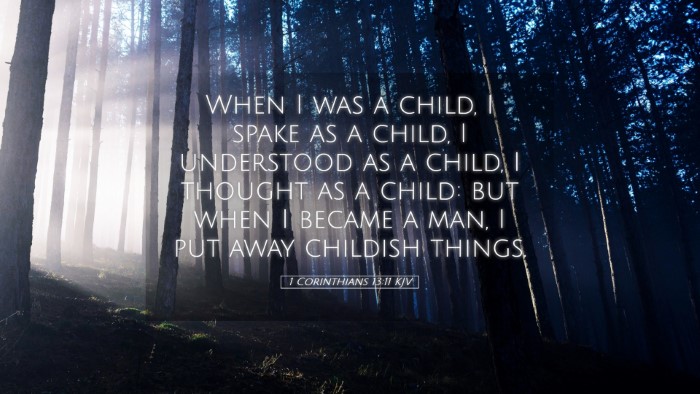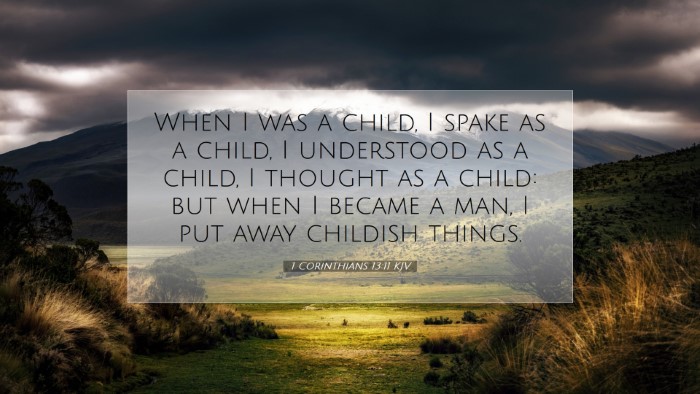Old Testament
Genesis Exodus Leviticus Numbers Deuteronomy Joshua Judges Ruth 1 Samuel 2 Samuel 1 Kings 2 Kings 1 Chronicles 2 Chronicles Ezra Nehemiah Esther Job Psalms Proverbs Ecclesiastes Song of Solomon Isaiah Jeremiah Lamentations Ezekiel Daniel Hosea Joel Amos Obadiah Jonah Micah Nahum Habakkuk Zephaniah Haggai Zechariah Malachi1 Corinthians 13:11
1 Corinthians 13:11 KJV
When I was a child, I spake as a child, I understood as a child, I thought as a child: but when I became a man, I put away childish things.
1 Corinthians 13:11 Bible Commentary
Commentary on 1 Corinthians 13:11
Verse: "When I was a child, I spake as a child, I understood as a child, I thought as a child: but when I became a man, I put away childish things." - 1 Corinthians 13:11
Introduction
This verse forms a crucial part of Paul's discourse on love and spiritual maturity. Here, the Apostle articulates the progression from childhood to adulthood in understanding and behavior. It serves both as a personal reflection and a broader lesson on the necessity of growth in the Christian faith.
Childhood vs. Adulthood in Spirituality
- Childish Behavior Defined: Paul begins by identifying the characteristics of childishness—spaking, understanding, and thinking in a limited, immature way. This reflects a self-centered viewpoint and a focus on the superficial.
- Adulthood as Growth: The transition to adulthood, as Paul notes, involves a radical change in behavior. This signifies a point of maturity—the believer must develop a deeper understanding of theology, ethics, and the essence of love.
Insights from Commentaries
Matthew Henry
Matthew Henry elucidates the idea that spiritual maturity is characterized by a deeper engagement with God’s truth. He emphasizes that a true understanding of God’s love compels a believer to transcend the elementary principles and embrace a more profound living in accordance with the Spirit.
Albert Barnes
Albert Barnes points out that the act of putting away childish things is not only an indication of personal growth but also exemplary of the community aspect of faith. He reminds us that as the church grows in love and understanding, it should collectively strive to cultivate a more profound spirituality that reflects Christ.
Adam Clarke
Adam Clarke, in his analysis, emphasizes that this transition is critical for understanding the perfect love that drives a mature Christian life. Clarke articulates that the focus should not be on merely forsaking childish actions but rather embracing the fullness of love that is only found in Christ. He positions love as the highest virtue that should guide all actions.
Application for Modern Believers
The principles extracted from this verse remain pertinent in contemporary Christian life. Here, believers are invited to introspectively examine areas where they may still exhibit immaturity, such as:
- Selfishness: Immature believers often prioritize their needs over the communal aspect of faith.
- Lack of Forgiveness: Holding grudges and failing to extend grace reflects a lack of spiritual maturity.
- Judgmental Attitudes: Failing to embrace an attitude of love and compassion can hinder spiritual growth.
The Call to Maturity
The call to maturity in 1 Corinthians 13:11 is not a suggestion but a divine command. As the Apostle Paul challenges the Corinthians, so too challenges modern believers to abandon the limitations of childish behavior:
- Engagement with Scripture: Deepening one's understanding through study leads to more mature insights.
- Participatory Growth: Engaging in fellowship and service allows believers to grow corporately in love and grace.
- Prayer and Reflection: Continuous self-evaluation through prayer can lead to the recognition and abandonment of immature behaviors.
Conclusion
In reflection, 1 Corinthians 13:11 encapsulates a timeless truth: as believers, we are called to grow. The challenge is to continually put away childish behaviors and thoughts in favor of a maturity rooted in love. Paul’s exhortation serves as a reminder that love is the greatest marker of Christian maturity, and it is through understanding and embracing the fullness of love that believers truly reflect Christ to the world.


